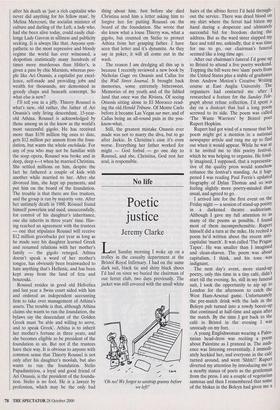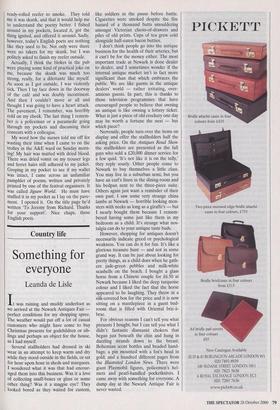Na life
Poetic justice
Jeremy Clarke
Last Sunday morning I woke up on a trolley in the casualty department at the Bristol Royal Infirmary. I had on the same dark suit, black tie and shiny black shoes I'd had on since we buried the chairman of our ferret club, two days previously. The jacket was still covered with the small white `Oh no! We forgot to unstrap granny before we left!' hairs of the albino ferret I'd held through- out the service. There was dried blood on my shirt where the ferret had bitten my hand during a desperate and ultimately successful bid for freedom during the address. But as the ward sister slapped my face and told me, unkindly, that it was time for me to go, our chairman's funeral seemed like a long time ago. After our chairman's funeral I'd gone up to Bristol to attend a live poetry weekend. Topping the bill were two 'slam' poets from the United States plus a stable of graduates from Andrew Motion's Creative Writing course at East Anglia University. The organisers had contacted me after I researched a feature for the Sunday Tele- graph about refuse collection. I'd spent a day on a dustcart that had a long poem screwed to its side. The poem was called `The Waste Warriors' by Bristol poet Rupert Hopkins. Rupert had got wind of a rumour that his poem might get a mention in a national newspaper article and rang me up to find out when it would appear. While he was at it he invited me to this poetry festival, which he was helping to organise. He fond- ly imagined, I supposed, that a representa- tive of the quality press would somehow enhance the festival's standing. As it hap- pened I was reading Paul Ferris's updated biography of Dylan Thomas and so was feeling slightly more poetry-minded than usual, and agreed to go. I arrived late for the first event on the Friday night — a session of stand-up poetry in a darkened theatre auditorium. Although I gave my full attention to as many of the poems as possible, 1 found most of them incomprehensible. Rupert himself did a turn at the mike. He recited a poem he'd written about the recent anti- capitalist 'march'. It was called 'The Prague Tapes'. He was smaller than I imagined and clean-shaven. The poem was about capitalism, I think, and his tone was indignant.
The next day's event, more stand-UP poetry, only this time in a tiny cafe, didn't start till the evening. So, still in my funeral suit, I took the opportunity to nip up to London for the afternoon to catch the West Ham-Arsenal game. Unfortunately the pre-match drink with the lads in the Boleyn pub turned into a rowdy booze-UP that continued at half-time and again after the match. By the time I got back to the café in Bristol in the evening I was unsteady on my feet. A young Englishwoman wearing a Pales- tinian head-dress was reciting a poem about Palestine as I pranced in. The audi- ence was listening reverentially. I immedi- ately heckled her, and everyone in the cafe turned around, and went `Shhh!!' Rupert diverted my attention by introducing me to a nearby stanza of poets as the gentleman from the press. I ate a couple of vegetarian samosas and then I remembered that some of the blokes in the Boleyn had given me a ready-rolled reefer to smoke. They told me it was skunk, and that it would help me to understand the poetry better. I fished around in my pockets, located it, got the thing ignited, and offered it around. Sadly, however, today's English poets are nothing like they used to be. Not only were there were no takers for my skunk, but I was politely asked to finish my reefer outside.
Actually, I think the blokes in the pub were playing some kind of practical joke on me, because the skunk was much too strong, really, for a dilettante like myself. As soon as I got outside, I was violently sick. Then I lay face down in the doorway of the café and was doubly incontinent. And then I couldn't move at all and thought I was going to have a heart attack. The pavement, I remember, was horribly cold on my cheek. The last thing I remem- ber is a policeman or a paramedic going through my pockets and discussing their contents with a colleague.
My word how the nurses told me off for wasting their time when I came to on the trolley in the A&E ward on Sunday morn- ing! My hair was matted with dried blood. There was dried vomit on my trouser legs and ferret hairs still adhered to my jacket. Groping in my pocket to see if my wallet was intact, I came across an unfamiliar pamphlet of poems, written and privately printed by one of the festival organisers. It was called Jigsaw World. He must have stuffed it in my pocket as I lay on the pave- ment. I opened it. On the title page he'd written 'To Jeremy from Richard. Thanks for your support'. Nice chaps, those English poets.



























































































 Previous page
Previous page